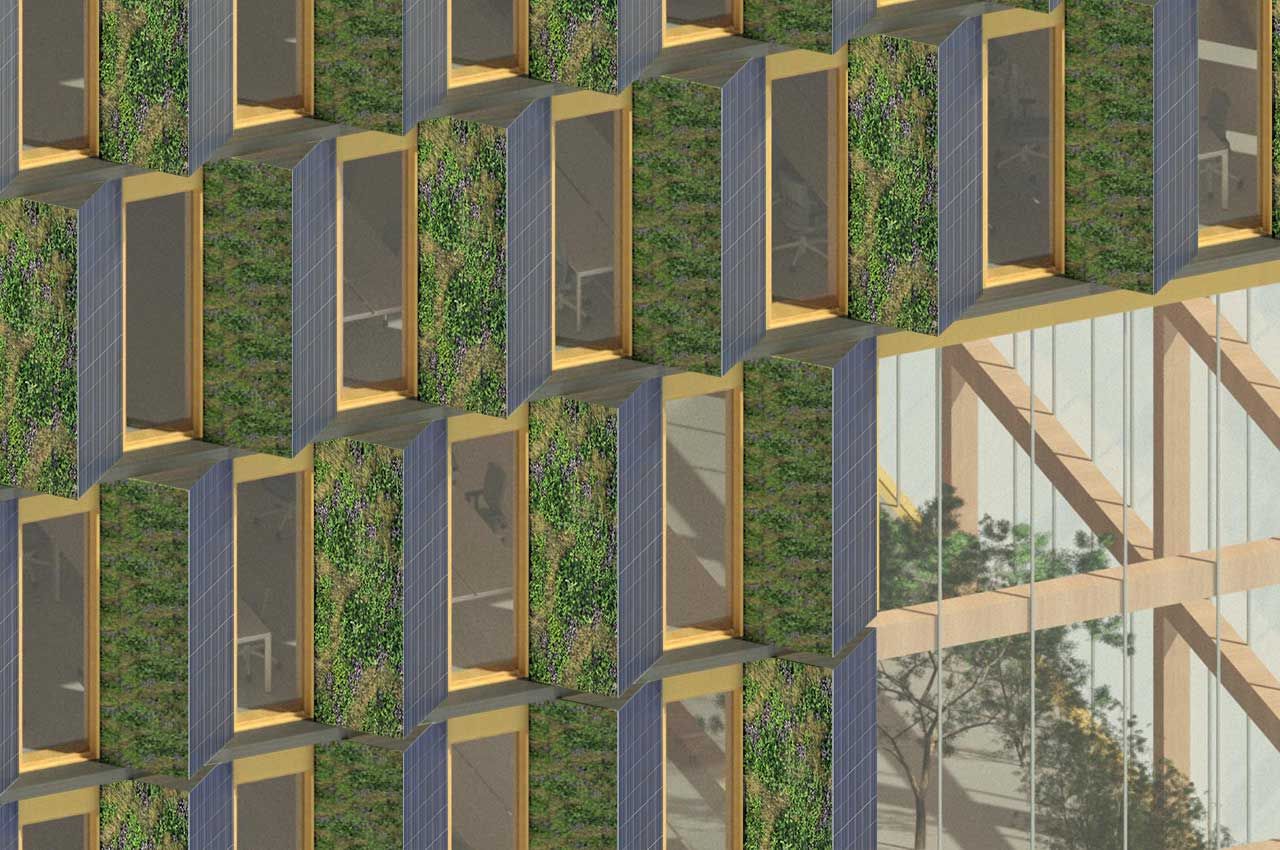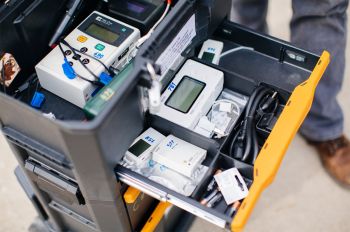Shining Success: Architectural Engineering Student Teams Succeed in DOE Solar Decathlon

Two Illinois Tech Department of Civil, Architectural, and Environmental Engineering student design teams successfully participated in the 2020 United States Department of Energy Solar Decathlon Design Challenge, winning first place in the competition’s Office Building Division and an honorable mention in the Mixed-Use Multifamily Division.
The Solar Decathlon Design Challenge inspires university student teams to design and build highly efficient and innovative buildings powered by renewable energy. Both teams blended architectural and engineering excellence with ingenuity to develop designs with market potential, building efficiency, and smart energy production.
Student teams began their journey to the 2020 Design Challenge by participating in two semester-long graduate courses, CAE 556/557 Net Zero Energy Home Design Competition I and II, led by Edoarda Corradi Dell’Acqua, a lecturer in architectural design and high-performance building design in the Department of Civil, Architectural, and Environmental Engineering. The goal of these courses is for an interdisciplinary team of students to design and provide full documentation for a building that meets the DOE’s Zero Energy Ready Homes requirements.
Corradi advised both teams that went on to participate in two of the six design challenge divisions. She says, “As an instructor, it is extremely rewarding to observe the design teams come together and their work progress and mature throughout the two semesters. Each year is unique, and I look forward to the next year and the next challenge.”
As part of the Office Building Division, Team River Heights-Vertical River earned first place and worked on the design of a 15-story office building located within Solomon Cordwell Buenz (SCB) Architects’ River District master plan. “Vertical River Office Building aims to become an example of sustainability and innovation, exploring how architecture can deal with some of the crucial issues of cities.” These concerns include climate change, satisfying the growing demand of office buildings, and generating new modern public spaces for citizens.
Fengyuan Jiang (M.E. ARCE 1st Year) contributed to the office building project and says, “There is no textbook, no traditional teaching, but sharing your ideas every week. Due to the fact that this is a net-zero high-rise building, every part needs to integrate closely and benefit each other.”
He adds, “Professors and industry partners offered us lots of valuable suggestions, which really broadened our horizons. From this experience, I learned how different disciplines react to a building. More importantly, I learned how to communicate and cooperate with others.”
Pablo Aranda Navarro (M.E. ARCE 1st Year) also contributed to this project and shares, “Working along with engineers made me feel closer to a professional work environment. When working alone in a studio, [I] should only convince the professors; now they needed strong justifications, as I was convincing other four engineers.”
He adds, “The great results obtained this year would have never been possible without every team member’s commitment. We were always respectful and open-minded with each other’s ideas; hence the design process has been thrilling and fun.”
For the Mixed-Use Multifamily Division, Team Melody earned an honorable mention and focused on repurposing Genevieve Melody STEM Elementary School, a recently closed Chicago Public Schools building, into a mixed-use multifamily building offering interim and low-income housing. “Melody can act as a social instrument and serve as a catalyst for revitalization.” Repurposing the school into a mixed-used multifamily space provides an opportunity for change within the community and acts as a model for other closed schools.
Erica Acton (ARCE/M.E. 4th Year), who worked on the design project for Melody public school, says, “The Solar Decathlon project is the kind of project that helps students learn the teamwork skills we actually need after graduation. Both of our teams worked together to make socially and environmentally impactful projects. This class taught me how iterative design is used in real life, how to make compromises, and how to prioritize project goals.”
The design challenge started with more than 70 teams, which were then narrowed to 45 teams from 31 institutions that were invited to the finals earlier this year. While students were unable to attend the finals typically held at the National Renewable Energy Laboratory due to COVID-19 restrictions, they successfully competed in the virtual event, which took place on April 17–19, 2020.
Students collaborated with faculty members from various degree programs, including Brent Stephens, Laurence Rohter, Mohammad Heidarinejad, Tommy Zakrzewski, Raymond Lemming, Eva Kultermann, Narjes Abbasabadi, and Frank Flury.
Stephens, an associate professor and the CAEE chair who is also director of the architectural engineering and environmental engineering programs, says, “This is a truly great set of accomplishments that continues to shine a spotlight on our excellent students and programs in the Department of Civil, Architectural, and Environmental Engineering at Illinois Tech.”
He adds, “[Lecturer] Corradi has now led teams to the finals in this competition five years in a row, and her sequence of graduate-level courses built around this competition has become a critical feature and highlight of our graduate programs.”
Both student teams also received support from the American Society of Heating, Refrigeration, and Air Conditioning Engineers (ASHRAE) Illinois Chapter and the following industry partners: Passive House Institute US (PHIUS), Elevate Energy, SCB, Chicago Public Schools (CPS), Single Room Housing Assistance Corporation (SRHAC), HKS, dbHMS, Baumann Consulting, zpd+a Architects, and Cushing Terrell.
View the complete list of this year’s Solar Decathlon Design Challenge winners to learn more about their final projects and creative solutions for real-world issues.
Congratulations to the following Illinois Tech students that participated in the competition:
Team River Heights-Vertical River
Sergio Vizcaino Gonzalez (M.E. ARCE 1st Year); Rafael Ventura Lopez (M.E. ARCE 1st Year); Nupoor Nileshkumar Kansara (M.E. ARCE 2nd Year); David Polzin (ARCE 4th Year); Jiang; and Navarro
Team Melody
Gracelyn Attablayo (M.E. ARCE 2nd Year); Enrique Orts Costa (M.S. ARCE 1st Year); Alwalid Dhaher (ARCE/M.E. 5th Year); Brianna Galvan (ARCE 5th Year); Areej Siddiqui (M.E. ARCE 1st Year); and Acton
Photo: A rendering of Team River Heights's Vertical River building that earned first place in the United States Department of Energy Solar Decathlon Design Challenge's Office Building Division (provided).




